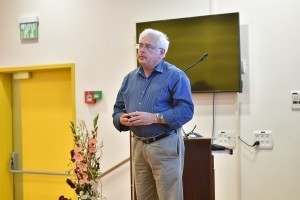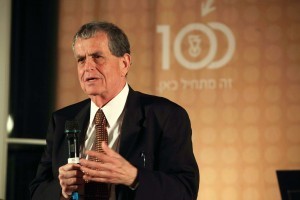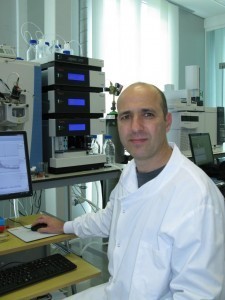Technion Integrated Cancer Center
Technion inaugurates new center for Cancer Research at a conference addressing the latest innovations in cancer research and treatment methods
The inauguration of the Center will take place on Sunday, November 20, 2016, at 18:00, the Rappaport Faculty of Medicine in the Ruth Auditorium
On this Sunday, Nov. 20th at a festive ceremony, Technion – Israel Institute of Technology will inaugurate the Technion Integrated Cancer Center (TICC). This is the first center of its kind in Israel, which will combine the extensive knowledge and vast experience in oncology accumulated at Technion and its affiliated medical centers. The ceremony will be attended by Technion President Prof. Peretz Lavie, Technion board members, local and international researchers and directors of the hospitals affiliated with Technion’s Rappaport Faculty of Medicine (Rambam Healthcare Campus, Bnai Zion Medical Center, Carmel Medical Center, Emek Medical Center in Afula and Hillel Yaffe Medical Center in Hadera).
 According to Technion President, Prof. Peretz Lavie, the Center is expected “to bring about a dramatic change in the field of cancer medicine in Israel, through diagnosis, treatment and follow-up based on the principles of personalized medicine.
According to Technion President, Prof. Peretz Lavie, the Center is expected “to bring about a dramatic change in the field of cancer medicine in Israel, through diagnosis, treatment and follow-up based on the principles of personalized medicine.
Over the past three years, Technion has recruited leading experts in cancer research, in both basic science and practical applications. They are renowned researchers in the fields of cancer biology, cancer cell metabolism and computational biology, who will cooperate in order to understand the pathways of the formation of cancer cells, unravel the mechanisms that make them resistant to anticancer drugs, and promote the development of new tools for diagnosis, treatment and follow-up care. Research activity at the Center will be conducted in collaboration with researchers from the Technion Faculties of Engineering and with the five medical centers affiliated with Technion’s Rappaport Faculty of Medicine, in order to forge a connection between the laboratory, clinical practice and applied research.”
The new center will be headed by Prof. Ze’ev Ronai and Nobel Laureate in Chemistry Distinguished Prof. Aaron Ciechanover.
 Prof. Ronai, who served up to now as Scientific Director at the Sanford Burnham Prebys Medical Discovery Institute (SBP)in San Diego, says “The Technion is an ideal place for cancer research, thanks to the unique interface between medicine, engineering, life sciences and basic science, and its close ties with the hospitals affiliated with the Faculty of Medicine. “According to Distinguished Professor Aaron Ciechanover, Nobel Laureate in Chemistry (2004), “the tremendous progress in medical science is advancing us to an era of personalized medicine, which will turn cancer from a terminal illness into a chronic illness. The new center, which will connect physicians and researchers from many different fields, will undoubtedly lead to major breakthroughs in cancer research, diagnosis and treatment.”
Prof. Ronai, who served up to now as Scientific Director at the Sanford Burnham Prebys Medical Discovery Institute (SBP)in San Diego, says “The Technion is an ideal place for cancer research, thanks to the unique interface between medicine, engineering, life sciences and basic science, and its close ties with the hospitals affiliated with the Faculty of Medicine. “According to Distinguished Professor Aaron Ciechanover, Nobel Laureate in Chemistry (2004), “the tremendous progress in medical science is advancing us to an era of personalized medicine, which will turn cancer from a terminal illness into a chronic illness. The new center, which will connect physicians and researchers from many different fields, will undoubtedly lead to major breakthroughs in cancer research, diagnosis and treatment.”
The conference, which will address the latest innovations in cancer research and the development of treatment methods, will be held on November 21-22 at Technion’s Rappaport Faculty of Medicine. The Conference will be attended by members of the Technion Integrated Cancer Center (TICC), including Professors Ronai and Ciechanover, and leading experts from Israel and abroad. They include, among others:
 Prof. Douglas Hanahan from the Swiss Federal Institute of Technology in Lausanne. Professor Hanahan is studying the development of cancerous tumors using genetically modified mice, in order to discover the pathogenic mechanisms leading to the formation of tumors and to develop new treatment strategies. His laboratory is currently focusing on the following cancers: melanoma, glioblastoma, pancreatic cancer and squamous cell carcinoma associated with the papilloma virus. Based on an understanding of how the system of blood vessels that feeds the tumor is formed around it, and of the role of chromosomes in the accelerated division of cancer cells, researchers at the lab strive to develop drugs that will halt this process.
Prof. Douglas Hanahan from the Swiss Federal Institute of Technology in Lausanne. Professor Hanahan is studying the development of cancerous tumors using genetically modified mice, in order to discover the pathogenic mechanisms leading to the formation of tumors and to develop new treatment strategies. His laboratory is currently focusing on the following cancers: melanoma, glioblastoma, pancreatic cancer and squamous cell carcinoma associated with the papilloma virus. Based on an understanding of how the system of blood vessels that feeds the tumor is formed around it, and of the role of chromosomes in the accelerated division of cancer cells, researchers at the lab strive to develop drugs that will halt this process.
Prof. Gad Getz, Director of the Center for Cancer Research at Massachusetts General Hospital (MGH), holds senior positions at Harvard Medical School, the Center for Cancer Research at MGH and at the Broad Institute of Harvard and MIT.
Getz is a world renowned expert in the characterization and cataloging of the cancer genome. He analyzes the genomics of cancer in two stages: A. Characterization – cataloging of all the genomic events and the mechanisms that generate them during the clonal evolution of cancer, comparing cancerous tissue to normal samples from the same patient; B. Interpretation – analyzing the above information across a sample of patients in order to identify changes in genes and the operating pathways that cause cancer or increase the risk of cancer, as well as identifying sub-types of the disease, their symptoms and the connection between them and clinical variables. Getz earned his B.Sc. from Hebrew University and his M.Sc. from Tel Aviv University. He later earned his Ph.D. from the Weizmann Institute and completed his postdoc at the Broad Institute.
Prof. Keith T. Flaherty, graduate of Yale University and Johns Hopkins University and currently Professor of Medicine at Harvard Medical School and Director of the Henri and Belinda Termeer Center for Targeted Therapies at the Massachusetts General Hospital Cancer Center. Prof. Flaherty participated in pioneering clinical trials of targeted therapies, mainly for melanoma. At the University of Pennsylvania, he led the first successful trial for the treatment of melanoma, one of the most deadly cancers. This trial demonstrated the efficacy of drugs that inhibit mutations of the B-RAF gene ihe treatment of melanoma.
Prof. Celeste Simon, from the Perelman School of Medicine at the University Pennsylvania, studies cancer cell metabolism, immunology of tumors, metastasis and cellular responses to oxygen deprivation. In order to survive, the tumor requires blood vessels from its surroundings to convey oxygen and nutrients to it. The aim of the research at Prof. Simon’s lab is to examine how the availability of nutrients affects the disruption of tissue health, focusing on cancer processes and the connection between chronic inflammation and the predisposition to cancer. Prof. Simon’s research team has demonstrated that hypoxia-inducible factors play an important role in metastasis.
Prof. Eyal Gottlieb, Director of the Cancer Metabolomics Lab at the TICC, is an internationally renowned expert in the field of metabolomics – measuring components of metabolism in cells under different conditions. Metabolism of cancer cells differs from that of normal cells and varies according to the type of tumor, and therefore metabolomics makes it possible to accurately distinguish between healthy cells and cancer cells. The applicable implications are clear: identifying and attacking cancer cells selectively without harming the healthy cells around them.
Click here for more information about the researchers attending the conference
Click here for an invitation to the opening ceremony
Click here for the conference program
For more information about the Technion Integrated Cancer Center: http://ticc.net.technion.ac.il


